Report: Enhancing Academic & Professional Skills at UNICEF
VerifiedAdded on 2020/06/03
|10
|2155
|47
Report
AI Summary
This report provides a detailed analysis of academic and professional skills within the context of UNICEF, a large charitable organization. It explores key areas such as building emotional intelligence, self-management skills, energy management, and self-esteem among employees. The report emphasizes the importance of these skills for fostering a healthy work environment, enhancing employee performance, and driving organizational growth. It discusses various techniques and methodologies, including IQ tests, training programs, and self-management strategies. The report also highlights the significance of energy management, the shift from traditional to modern paradigms, and the role of self-esteem and confidence in employee motivation. Recommendations are provided to help UNICEF adopt effective training and development programs and create a more inclusive and productive workplace. The report concludes by emphasizing the necessity of employee self-development through academic and professional skills, ultimately contributing to a more effective management style.
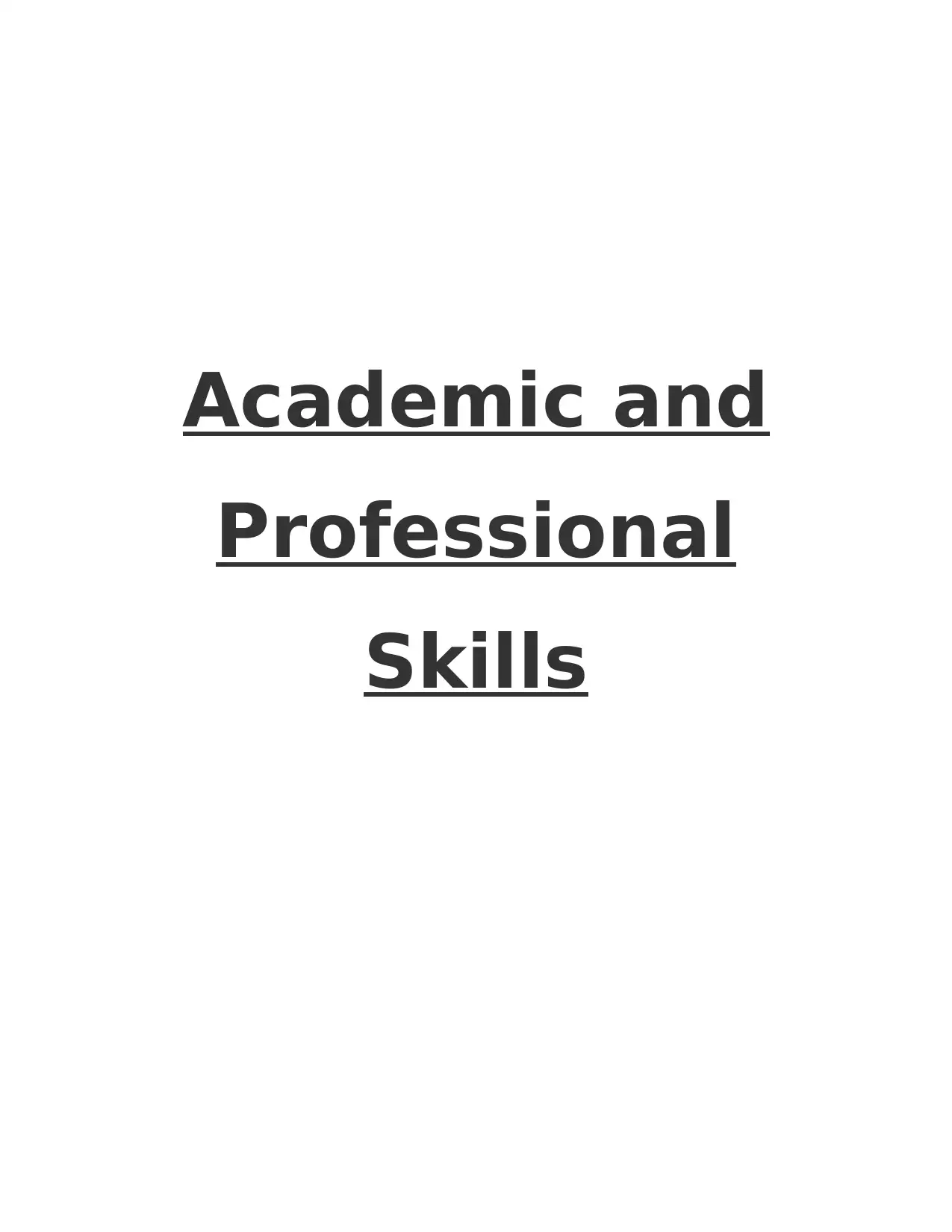
Academic and
Professional
Skills
Professional
Skills
Paraphrase This Document
Need a fresh take? Get an instant paraphrase of this document with our AI Paraphraser
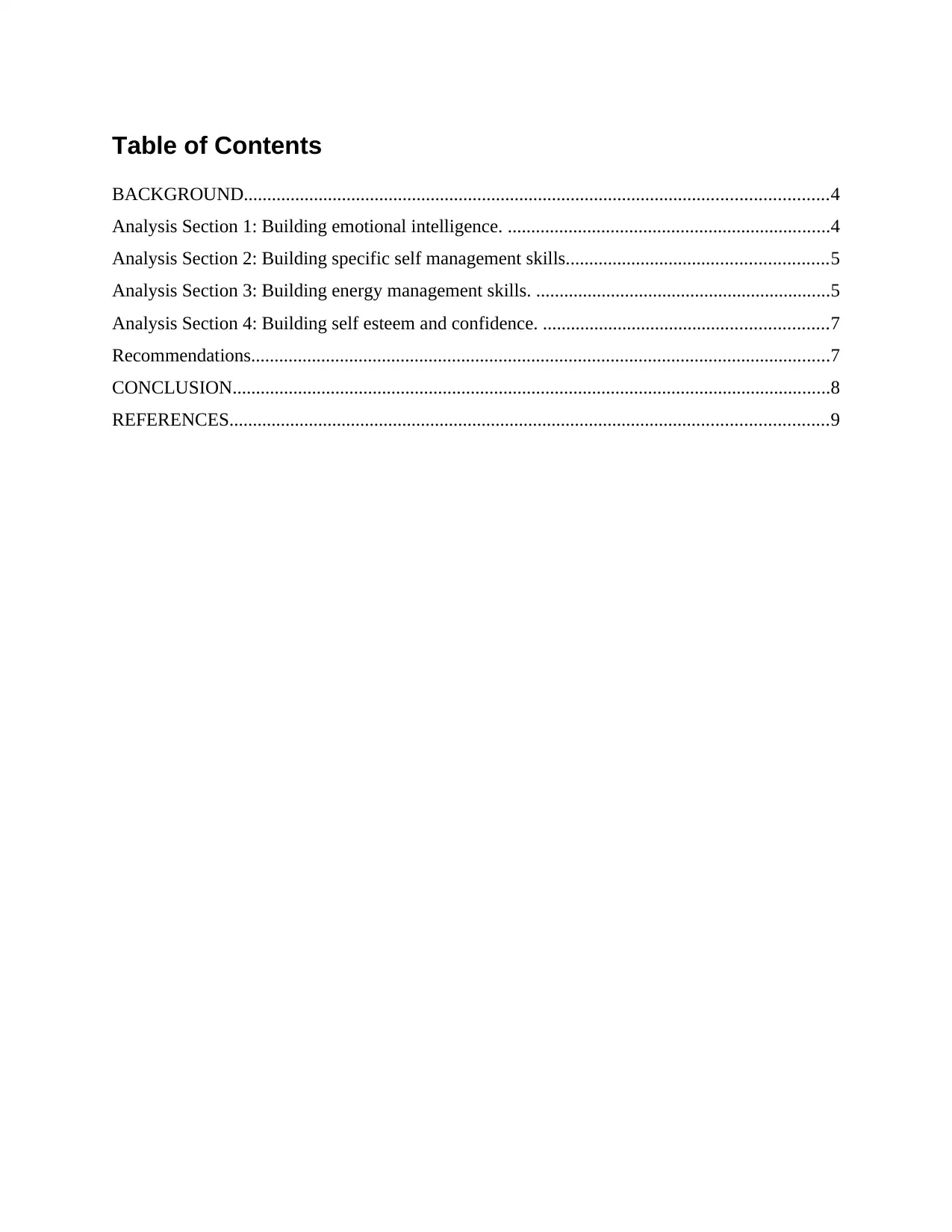
Table of Contents
BACKGROUND.............................................................................................................................4
Analysis Section 1: Building emotional intelligence. .....................................................................4
Analysis Section 2: Building specific self management skills........................................................5
Analysis Section 3: Building energy management skills. ...............................................................5
Analysis Section 4: Building self esteem and confidence. .............................................................7
Recommendations............................................................................................................................7
CONCLUSION................................................................................................................................8
REFERENCES................................................................................................................................9
BACKGROUND.............................................................................................................................4
Analysis Section 1: Building emotional intelligence. .....................................................................4
Analysis Section 2: Building specific self management skills........................................................5
Analysis Section 3: Building energy management skills. ...............................................................5
Analysis Section 4: Building self esteem and confidence. .............................................................7
Recommendations............................................................................................................................7
CONCLUSION................................................................................................................................8
REFERENCES................................................................................................................................9
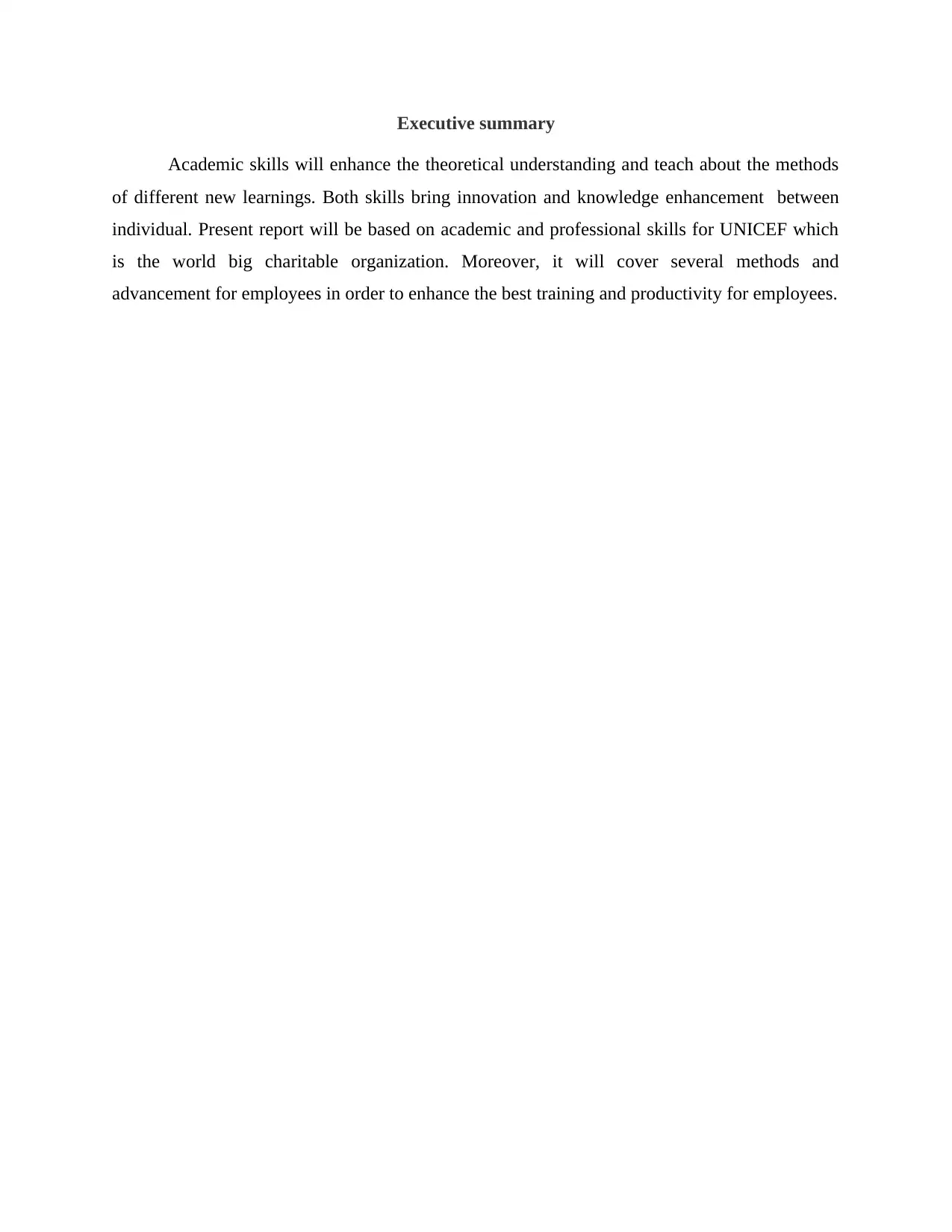
Executive summary
Academic skills will enhance the theoretical understanding and teach about the methods
of different new learnings. Both skills bring innovation and knowledge enhancement between
individual. Present report will be based on academic and professional skills for UNICEF which
is the world big charitable organization. Moreover, it will cover several methods and
advancement for employees in order to enhance the best training and productivity for employees.
Academic skills will enhance the theoretical understanding and teach about the methods
of different new learnings. Both skills bring innovation and knowledge enhancement between
individual. Present report will be based on academic and professional skills for UNICEF which
is the world big charitable organization. Moreover, it will cover several methods and
advancement for employees in order to enhance the best training and productivity for employees.
⊘ This is a preview!⊘
Do you want full access?
Subscribe today to unlock all pages.

Trusted by 1+ million students worldwide
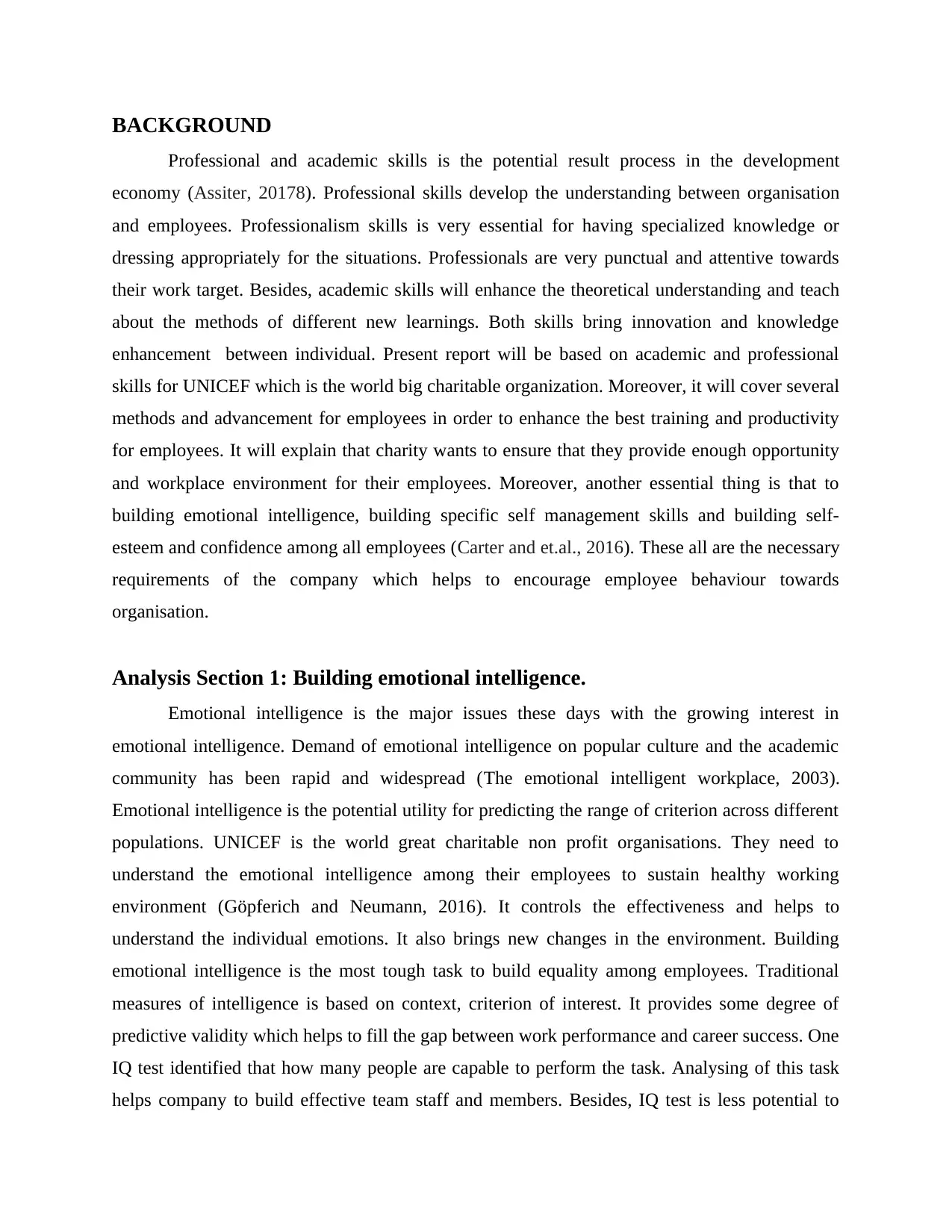
BACKGROUND
Professional and academic skills is the potential result process in the development
economy (Assiter, 20178). Professional skills develop the understanding between organisation
and employees. Professionalism skills is very essential for having specialized knowledge or
dressing appropriately for the situations. Professionals are very punctual and attentive towards
their work target. Besides, academic skills will enhance the theoretical understanding and teach
about the methods of different new learnings. Both skills bring innovation and knowledge
enhancement between individual. Present report will be based on academic and professional
skills for UNICEF which is the world big charitable organization. Moreover, it will cover several
methods and advancement for employees in order to enhance the best training and productivity
for employees. It will explain that charity wants to ensure that they provide enough opportunity
and workplace environment for their employees. Moreover, another essential thing is that to
building emotional intelligence, building specific self management skills and building self-
esteem and confidence among all employees (Carter and et.al., 2016). These all are the necessary
requirements of the company which helps to encourage employee behaviour towards
organisation.
Analysis Section 1: Building emotional intelligence.
Emotional intelligence is the major issues these days with the growing interest in
emotional intelligence. Demand of emotional intelligence on popular culture and the academic
community has been rapid and widespread (The emotional intelligent workplace, 2003).
Emotional intelligence is the potential utility for predicting the range of criterion across different
populations. UNICEF is the world great charitable non profit organisations. They need to
understand the emotional intelligence among their employees to sustain healthy working
environment (Göpferich and Neumann, 2016). It controls the effectiveness and helps to
understand the individual emotions. It also brings new changes in the environment. Building
emotional intelligence is the most tough task to build equality among employees. Traditional
measures of intelligence is based on context, criterion of interest. It provides some degree of
predictive validity which helps to fill the gap between work performance and career success. One
IQ test identified that how many people are capable to perform the task. Analysing of this task
helps company to build effective team staff and members. Besides, IQ test is less potential to
Professional and academic skills is the potential result process in the development
economy (Assiter, 20178). Professional skills develop the understanding between organisation
and employees. Professionalism skills is very essential for having specialized knowledge or
dressing appropriately for the situations. Professionals are very punctual and attentive towards
their work target. Besides, academic skills will enhance the theoretical understanding and teach
about the methods of different new learnings. Both skills bring innovation and knowledge
enhancement between individual. Present report will be based on academic and professional
skills for UNICEF which is the world big charitable organization. Moreover, it will cover several
methods and advancement for employees in order to enhance the best training and productivity
for employees. It will explain that charity wants to ensure that they provide enough opportunity
and workplace environment for their employees. Moreover, another essential thing is that to
building emotional intelligence, building specific self management skills and building self-
esteem and confidence among all employees (Carter and et.al., 2016). These all are the necessary
requirements of the company which helps to encourage employee behaviour towards
organisation.
Analysis Section 1: Building emotional intelligence.
Emotional intelligence is the major issues these days with the growing interest in
emotional intelligence. Demand of emotional intelligence on popular culture and the academic
community has been rapid and widespread (The emotional intelligent workplace, 2003).
Emotional intelligence is the potential utility for predicting the range of criterion across different
populations. UNICEF is the world great charitable non profit organisations. They need to
understand the emotional intelligence among their employees to sustain healthy working
environment (Göpferich and Neumann, 2016). It controls the effectiveness and helps to
understand the individual emotions. It also brings new changes in the environment. Building
emotional intelligence is the most tough task to build equality among employees. Traditional
measures of intelligence is based on context, criterion of interest. It provides some degree of
predictive validity which helps to fill the gap between work performance and career success. One
IQ test identified that how many people are capable to perform the task. Analysing of this task
helps company to build effective team staff and members. Besides, IQ test is less potential to
Paraphrase This Document
Need a fresh take? Get an instant paraphrase of this document with our AI Paraphraser
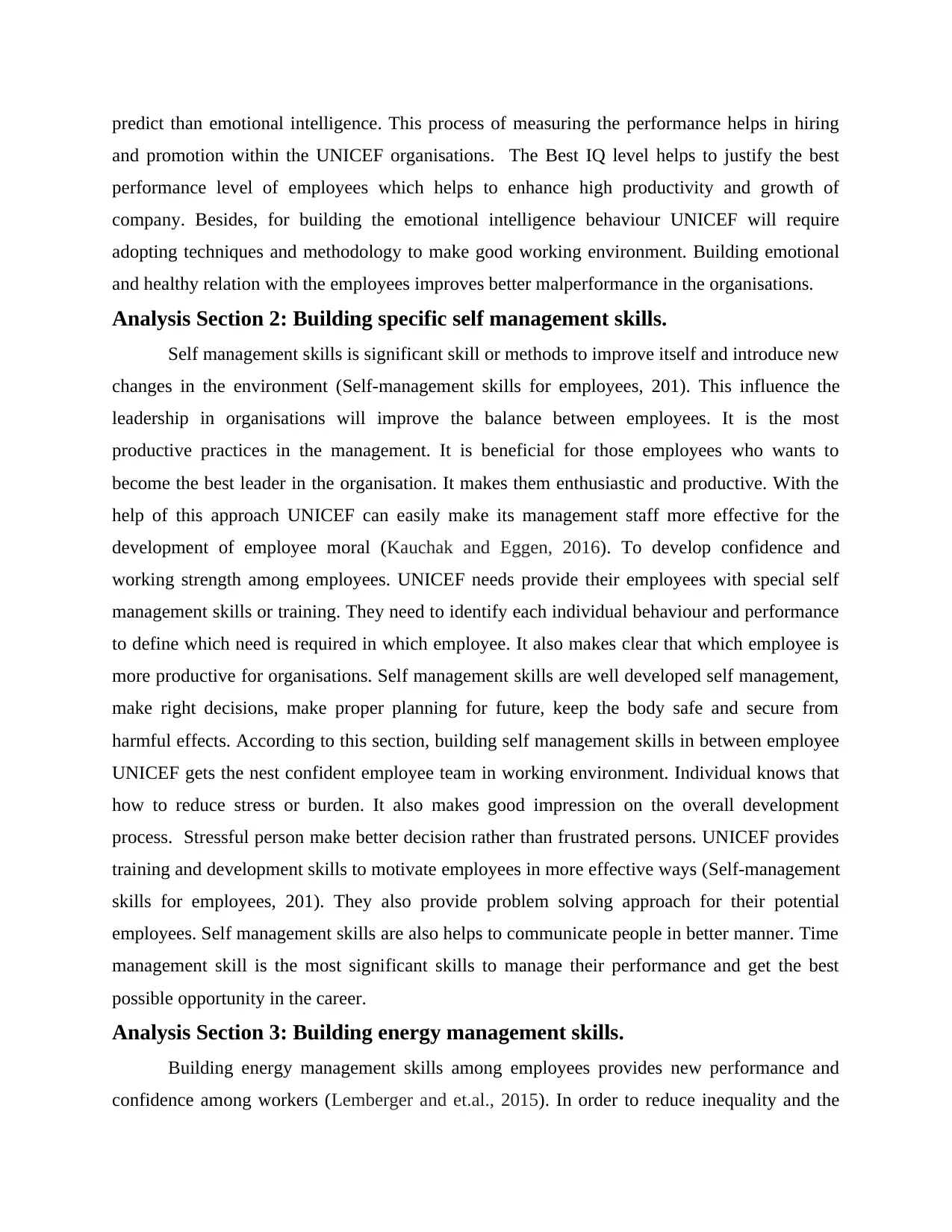
predict than emotional intelligence. This process of measuring the performance helps in hiring
and promotion within the UNICEF organisations. The Best IQ level helps to justify the best
performance level of employees which helps to enhance high productivity and growth of
company. Besides, for building the emotional intelligence behaviour UNICEF will require
adopting techniques and methodology to make good working environment. Building emotional
and healthy relation with the employees improves better malperformance in the organisations.
Analysis Section 2: Building specific self management skills.
Self management skills is significant skill or methods to improve itself and introduce new
changes in the environment (Self-management skills for employees, 201). This influence the
leadership in organisations will improve the balance between employees. It is the most
productive practices in the management. It is beneficial for those employees who wants to
become the best leader in the organisation. It makes them enthusiastic and productive. With the
help of this approach UNICEF can easily make its management staff more effective for the
development of employee moral (Kauchak and Eggen, 2016). To develop confidence and
working strength among employees. UNICEF needs provide their employees with special self
management skills or training. They need to identify each individual behaviour and performance
to define which need is required in which employee. It also makes clear that which employee is
more productive for organisations. Self management skills are well developed self management,
make right decisions, make proper planning for future, keep the body safe and secure from
harmful effects. According to this section, building self management skills in between employee
UNICEF gets the nest confident employee team in working environment. Individual knows that
how to reduce stress or burden. It also makes good impression on the overall development
process. Stressful person make better decision rather than frustrated persons. UNICEF provides
training and development skills to motivate employees in more effective ways (Self-management
skills for employees, 201). They also provide problem solving approach for their potential
employees. Self management skills are also helps to communicate people in better manner. Time
management skill is the most significant skills to manage their performance and get the best
possible opportunity in the career.
Analysis Section 3: Building energy management skills.
Building energy management skills among employees provides new performance and
confidence among workers (Lemberger and et.al., 2015). In order to reduce inequality and the
and promotion within the UNICEF organisations. The Best IQ level helps to justify the best
performance level of employees which helps to enhance high productivity and growth of
company. Besides, for building the emotional intelligence behaviour UNICEF will require
adopting techniques and methodology to make good working environment. Building emotional
and healthy relation with the employees improves better malperformance in the organisations.
Analysis Section 2: Building specific self management skills.
Self management skills is significant skill or methods to improve itself and introduce new
changes in the environment (Self-management skills for employees, 201). This influence the
leadership in organisations will improve the balance between employees. It is the most
productive practices in the management. It is beneficial for those employees who wants to
become the best leader in the organisation. It makes them enthusiastic and productive. With the
help of this approach UNICEF can easily make its management staff more effective for the
development of employee moral (Kauchak and Eggen, 2016). To develop confidence and
working strength among employees. UNICEF needs provide their employees with special self
management skills or training. They need to identify each individual behaviour and performance
to define which need is required in which employee. It also makes clear that which employee is
more productive for organisations. Self management skills are well developed self management,
make right decisions, make proper planning for future, keep the body safe and secure from
harmful effects. According to this section, building self management skills in between employee
UNICEF gets the nest confident employee team in working environment. Individual knows that
how to reduce stress or burden. It also makes good impression on the overall development
process. Stressful person make better decision rather than frustrated persons. UNICEF provides
training and development skills to motivate employees in more effective ways (Self-management
skills for employees, 201). They also provide problem solving approach for their potential
employees. Self management skills are also helps to communicate people in better manner. Time
management skill is the most significant skills to manage their performance and get the best
possible opportunity in the career.
Analysis Section 3: Building energy management skills.
Building energy management skills among employees provides new performance and
confidence among workers (Lemberger and et.al., 2015). In order to reduce inequality and the
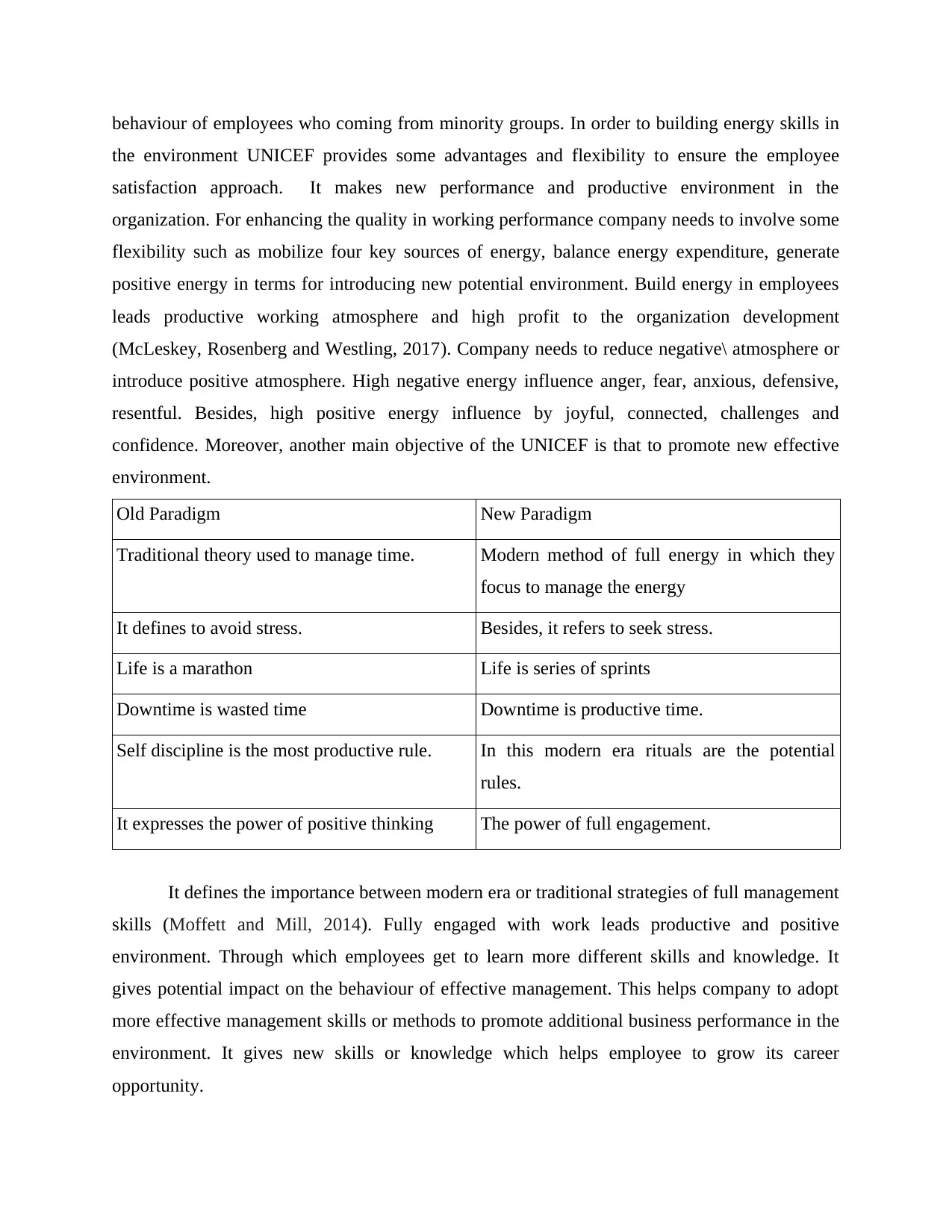
behaviour of employees who coming from minority groups. In order to building energy skills in
the environment UNICEF provides some advantages and flexibility to ensure the employee
satisfaction approach. It makes new performance and productive environment in the
organization. For enhancing the quality in working performance company needs to involve some
flexibility such as mobilize four key sources of energy, balance energy expenditure, generate
positive energy in terms for introducing new potential environment. Build energy in employees
leads productive working atmosphere and high profit to the organization development
(McLeskey, Rosenberg and Westling, 2017). Company needs to reduce negative\ atmosphere or
introduce positive atmosphere. High negative energy influence anger, fear, anxious, defensive,
resentful. Besides, high positive energy influence by joyful, connected, challenges and
confidence. Moreover, another main objective of the UNICEF is that to promote new effective
environment.
Old Paradigm New Paradigm
Traditional theory used to manage time. Modern method of full energy in which they
focus to manage the energy
It defines to avoid stress. Besides, it refers to seek stress.
Life is a marathon Life is series of sprints
Downtime is wasted time Downtime is productive time.
Self discipline is the most productive rule. In this modern era rituals are the potential
rules.
It expresses the power of positive thinking The power of full engagement.
It defines the importance between modern era or traditional strategies of full management
skills (Moffett and Mill, 2014). Fully engaged with work leads productive and positive
environment. Through which employees get to learn more different skills and knowledge. It
gives potential impact on the behaviour of effective management. This helps company to adopt
more effective management skills or methods to promote additional business performance in the
environment. It gives new skills or knowledge which helps employee to grow its career
opportunity.
the environment UNICEF provides some advantages and flexibility to ensure the employee
satisfaction approach. It makes new performance and productive environment in the
organization. For enhancing the quality in working performance company needs to involve some
flexibility such as mobilize four key sources of energy, balance energy expenditure, generate
positive energy in terms for introducing new potential environment. Build energy in employees
leads productive working atmosphere and high profit to the organization development
(McLeskey, Rosenberg and Westling, 2017). Company needs to reduce negative\ atmosphere or
introduce positive atmosphere. High negative energy influence anger, fear, anxious, defensive,
resentful. Besides, high positive energy influence by joyful, connected, challenges and
confidence. Moreover, another main objective of the UNICEF is that to promote new effective
environment.
Old Paradigm New Paradigm
Traditional theory used to manage time. Modern method of full energy in which they
focus to manage the energy
It defines to avoid stress. Besides, it refers to seek stress.
Life is a marathon Life is series of sprints
Downtime is wasted time Downtime is productive time.
Self discipline is the most productive rule. In this modern era rituals are the potential
rules.
It expresses the power of positive thinking The power of full engagement.
It defines the importance between modern era or traditional strategies of full management
skills (Moffett and Mill, 2014). Fully engaged with work leads productive and positive
environment. Through which employees get to learn more different skills and knowledge. It
gives potential impact on the behaviour of effective management. This helps company to adopt
more effective management skills or methods to promote additional business performance in the
environment. It gives new skills or knowledge which helps employee to grow its career
opportunity.
⊘ This is a preview!⊘
Do you want full access?
Subscribe today to unlock all pages.

Trusted by 1+ million students worldwide
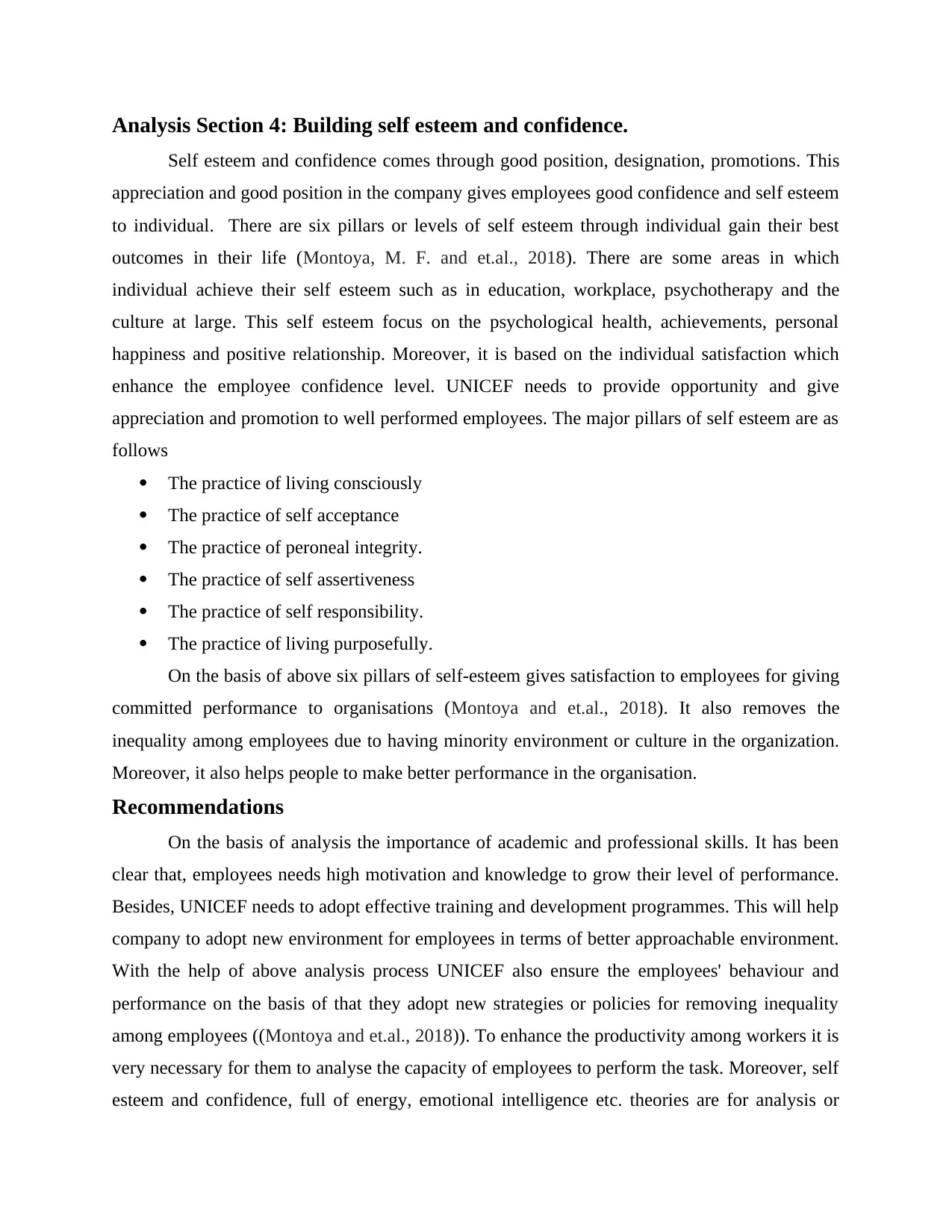
Analysis Section 4: Building self esteem and confidence.
Self esteem and confidence comes through good position, designation, promotions. This
appreciation and good position in the company gives employees good confidence and self esteem
to individual. There are six pillars or levels of self esteem through individual gain their best
outcomes in their life (Montoya, M. F. and et.al., 2018). There are some areas in which
individual achieve their self esteem such as in education, workplace, psychotherapy and the
culture at large. This self esteem focus on the psychological health, achievements, personal
happiness and positive relationship. Moreover, it is based on the individual satisfaction which
enhance the employee confidence level. UNICEF needs to provide opportunity and give
appreciation and promotion to well performed employees. The major pillars of self esteem are as
follows
The practice of living consciously
The practice of self acceptance
The practice of peroneal integrity.
The practice of self assertiveness
The practice of self responsibility.
The practice of living purposefully.
On the basis of above six pillars of self-esteem gives satisfaction to employees for giving
committed performance to organisations (Montoya and et.al., 2018). It also removes the
inequality among employees due to having minority environment or culture in the organization.
Moreover, it also helps people to make better performance in the organisation.
Recommendations
On the basis of analysis the importance of academic and professional skills. It has been
clear that, employees needs high motivation and knowledge to grow their level of performance.
Besides, UNICEF needs to adopt effective training and development programmes. This will help
company to adopt new environment for employees in terms of better approachable environment.
With the help of above analysis process UNICEF also ensure the employees' behaviour and
performance on the basis of that they adopt new strategies or policies for removing inequality
among employees ((Montoya and et.al., 2018)). To enhance the productivity among workers it is
very necessary for them to analyse the capacity of employees to perform the task. Moreover, self
esteem and confidence, full of energy, emotional intelligence etc. theories are for analysis or
Self esteem and confidence comes through good position, designation, promotions. This
appreciation and good position in the company gives employees good confidence and self esteem
to individual. There are six pillars or levels of self esteem through individual gain their best
outcomes in their life (Montoya, M. F. and et.al., 2018). There are some areas in which
individual achieve their self esteem such as in education, workplace, psychotherapy and the
culture at large. This self esteem focus on the psychological health, achievements, personal
happiness and positive relationship. Moreover, it is based on the individual satisfaction which
enhance the employee confidence level. UNICEF needs to provide opportunity and give
appreciation and promotion to well performed employees. The major pillars of self esteem are as
follows
The practice of living consciously
The practice of self acceptance
The practice of peroneal integrity.
The practice of self assertiveness
The practice of self responsibility.
The practice of living purposefully.
On the basis of above six pillars of self-esteem gives satisfaction to employees for giving
committed performance to organisations (Montoya and et.al., 2018). It also removes the
inequality among employees due to having minority environment or culture in the organization.
Moreover, it also helps people to make better performance in the organisation.
Recommendations
On the basis of analysis the importance of academic and professional skills. It has been
clear that, employees needs high motivation and knowledge to grow their level of performance.
Besides, UNICEF needs to adopt effective training and development programmes. This will help
company to adopt new environment for employees in terms of better approachable environment.
With the help of above analysis process UNICEF also ensure the employees' behaviour and
performance on the basis of that they adopt new strategies or policies for removing inequality
among employees ((Montoya and et.al., 2018)). To enhance the productivity among workers it is
very necessary for them to analyse the capacity of employees to perform the task. Moreover, self
esteem and confidence, full of energy, emotional intelligence etc. theories are for analysis or
Paraphrase This Document
Need a fresh take? Get an instant paraphrase of this document with our AI Paraphraser
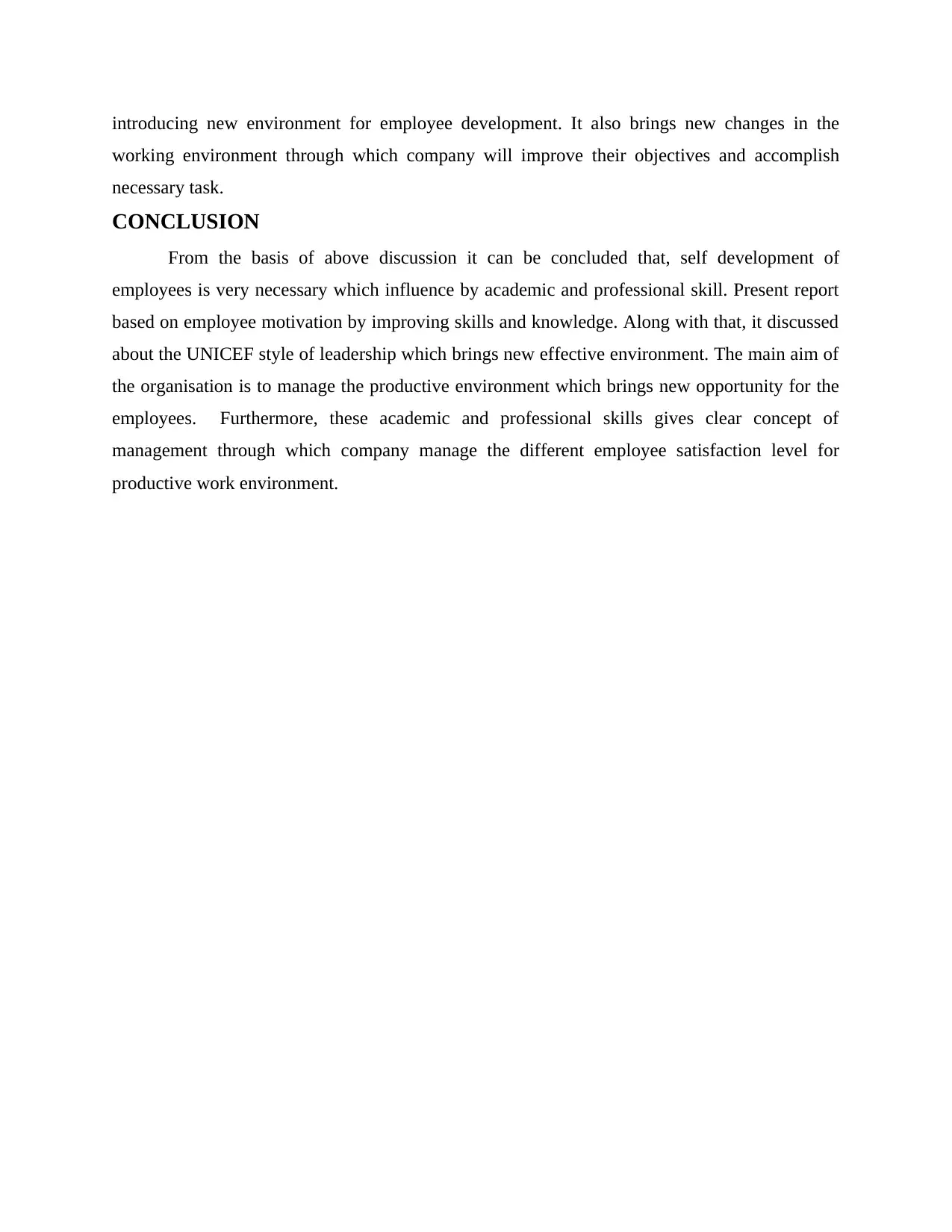
introducing new environment for employee development. It also brings new changes in the
working environment through which company will improve their objectives and accomplish
necessary task.
CONCLUSION
From the basis of above discussion it can be concluded that, self development of
employees is very necessary which influence by academic and professional skill. Present report
based on employee motivation by improving skills and knowledge. Along with that, it discussed
about the UNICEF style of leadership which brings new effective environment. The main aim of
the organisation is to manage the productive environment which brings new opportunity for the
employees. Furthermore, these academic and professional skills gives clear concept of
management through which company manage the different employee satisfaction level for
productive work environment.
working environment through which company will improve their objectives and accomplish
necessary task.
CONCLUSION
From the basis of above discussion it can be concluded that, self development of
employees is very necessary which influence by academic and professional skill. Present report
based on employee motivation by improving skills and knowledge. Along with that, it discussed
about the UNICEF style of leadership which brings new effective environment. The main aim of
the organisation is to manage the productive environment which brings new opportunity for the
employees. Furthermore, these academic and professional skills gives clear concept of
management through which company manage the different employee satisfaction level for
productive work environment.
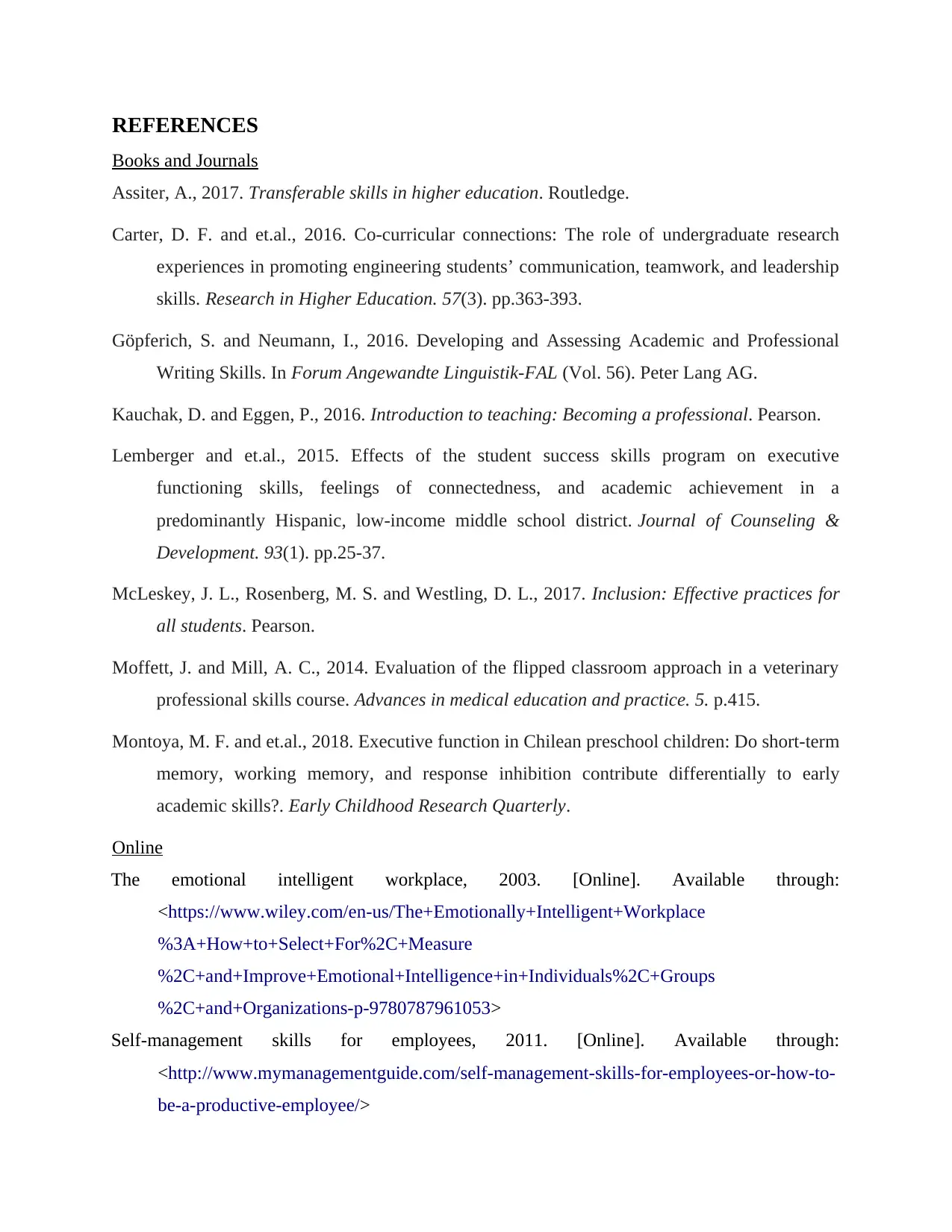
REFERENCES
Books and Journals
Assiter, A., 2017. Transferable skills in higher education. Routledge.
Carter, D. F. and et.al., 2016. Co-curricular connections: The role of undergraduate research
experiences in promoting engineering students’ communication, teamwork, and leadership
skills. Research in Higher Education. 57(3). pp.363-393.
Göpferich, S. and Neumann, I., 2016. Developing and Assessing Academic and Professional
Writing Skills. In Forum Angewandte Linguistik-FAL (Vol. 56). Peter Lang AG.
Kauchak, D. and Eggen, P., 2016. Introduction to teaching: Becoming a professional. Pearson.
Lemberger and et.al., 2015. Effects of the student success skills program on executive
functioning skills, feelings of connectedness, and academic achievement in a
predominantly Hispanic, low‐income middle school district. Journal of Counseling &
Development. 93(1). pp.25-37.
McLeskey, J. L., Rosenberg, M. S. and Westling, D. L., 2017. Inclusion: Effective practices for
all students. Pearson.
Moffett, J. and Mill, A. C., 2014. Evaluation of the flipped classroom approach in a veterinary
professional skills course. Advances in medical education and practice. 5. p.415.
Montoya, M. F. and et.al., 2018. Executive function in Chilean preschool children: Do short-term
memory, working memory, and response inhibition contribute differentially to early
academic skills?. Early Childhood Research Quarterly.
Online
The emotional intelligent workplace, 2003. [Online]. Available through:
<https://www.wiley.com/en-us/The+Emotionally+Intelligent+Workplace
%3A+How+to+Select+For%2C+Measure
%2C+and+Improve+Emotional+Intelligence+in+Individuals%2C+Groups
%2C+and+Organizations-p-9780787961053>
Self-management skills for employees, 2011. [Online]. Available through:
<http://www.mymanagementguide.com/self-management-skills-for-employees-or-how-to-
be-a-productive-employee/>
Books and Journals
Assiter, A., 2017. Transferable skills in higher education. Routledge.
Carter, D. F. and et.al., 2016. Co-curricular connections: The role of undergraduate research
experiences in promoting engineering students’ communication, teamwork, and leadership
skills. Research in Higher Education. 57(3). pp.363-393.
Göpferich, S. and Neumann, I., 2016. Developing and Assessing Academic and Professional
Writing Skills. In Forum Angewandte Linguistik-FAL (Vol. 56). Peter Lang AG.
Kauchak, D. and Eggen, P., 2016. Introduction to teaching: Becoming a professional. Pearson.
Lemberger and et.al., 2015. Effects of the student success skills program on executive
functioning skills, feelings of connectedness, and academic achievement in a
predominantly Hispanic, low‐income middle school district. Journal of Counseling &
Development. 93(1). pp.25-37.
McLeskey, J. L., Rosenberg, M. S. and Westling, D. L., 2017. Inclusion: Effective practices for
all students. Pearson.
Moffett, J. and Mill, A. C., 2014. Evaluation of the flipped classroom approach in a veterinary
professional skills course. Advances in medical education and practice. 5. p.415.
Montoya, M. F. and et.al., 2018. Executive function in Chilean preschool children: Do short-term
memory, working memory, and response inhibition contribute differentially to early
academic skills?. Early Childhood Research Quarterly.
Online
The emotional intelligent workplace, 2003. [Online]. Available through:
<https://www.wiley.com/en-us/The+Emotionally+Intelligent+Workplace
%3A+How+to+Select+For%2C+Measure
%2C+and+Improve+Emotional+Intelligence+in+Individuals%2C+Groups
%2C+and+Organizations-p-9780787961053>
Self-management skills for employees, 2011. [Online]. Available through:
<http://www.mymanagementguide.com/self-management-skills-for-employees-or-how-to-
be-a-productive-employee/>
⊘ This is a preview!⊘
Do you want full access?
Subscribe today to unlock all pages.

Trusted by 1+ million students worldwide

1 out of 10
Related Documents
Your All-in-One AI-Powered Toolkit for Academic Success.
+13062052269
info@desklib.com
Available 24*7 on WhatsApp / Email
![[object Object]](/_next/static/media/star-bottom.7253800d.svg)
Unlock your academic potential
Copyright © 2020–2026 A2Z Services. All Rights Reserved. Developed and managed by ZUCOL.





